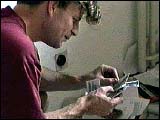I QUIT MY JOB at the Daily Telegraph in January, 1995 and left the Balkans for San Francisco. Gaga followed like a stowaway, slipping into my thoughts and dreams without invitation or warning.
By the time I returned to Bosnia in May, 1996, most Serbs had fled the areas around Sarajevo. Fearing Serb thugs and Muslim revenge, they followed in the wake of a negotiated withdrawal of the Bosnian Serb army under the Dayton peace accords. Serbs burned many of Grbavica's buildings in a scorched-earth policy driven by spite.
Roaming Grbavica freely for the first time since the war began, I found strange clues about Gaga's life and death. I found some of his possessions dumped in heaps in a gutted flat, one floor below the apartment where he had died. Among the litter, I uncovered old photographs of the two of us standing in the mountains above Sarajevo.

Across town, I found Fikreta living among refugees. No longer living in fear of Serb retaliation, she described a shocking new side of Gaga. She told me how Gaga looted Muslim homes throughout Grbavica and sold the goods for booze. Gaga would terrorize Muslims with mock assassinations, shooting his pistol at their heads and missing by millimeters. He pitched hand grenades off balconies at people below.
With Fikreta and other Muslims listening, he boasted to Serb friends about torturing Muslim prisoners. He even shot and slightly wounded Fikreta's daughter--with whom some say he was in love.
These stories were corroborated by others--Muslims and Serbs--who were in Grbavica at the time.
I had also heard credible reports that Gaga was a sniper. To me, this was the most troubling detail of all, because Serb snipers killed more than 1,000 civilians during the siege, including 300 children according to Bosnian government figures.
Next: Graveyard
Image: Michael sifts through Gaga's possessions (Link: Reminders)